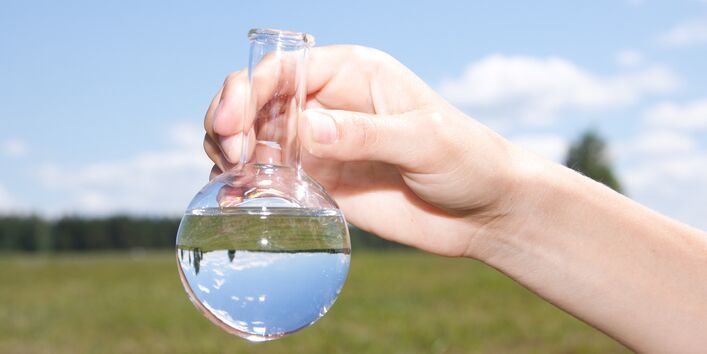New measures to protect natural groundwater against trace substances
Parliamentary State Secretary Bettina Hoffmann at the BMUV and the Federal Trace Substance Centre received the first results from three roundtables on the Trace Substance Strategy. The residues of pharmaceutical drugs, plant protection products, biocides and other chemicals can have a negative impact on water bodies and drinking water quality, even in low concentrations. As part of the Federal Government's Trace Substance Strategy, interest groups are currently developing voluntary measures at roundtables to reduce the burden on the environment. Representatives of the roundtables presented first results today. At their virtual meeting, Ms Hoffmann also presented strategic cornerstones and perspectives for the current legislative period.
Bettina Hoffmann, Parliamentary State Secretary at the BMUV, said: “Keeping groundwater clean and available is active protection of the environment and health. 70 percent of our drinking water is groundwater. Whereas in the past we took groundwater for granted, global warming is increasingly causing prolonged droughts that deplete the groundwater level in Germany. More and more substances are entering our waters via wastewater that do not belong there. Chemicals from industry and pharmaceuticals, some of which do not degrade naturally, are rapidly polluting the ecosystems of rivers, lakes and groundwater. It is the responsibility of society as a whole end this. It is important to stop the input of pollutants directly at the source wherever possible. The Trace Substances Centre at the German Environment Agency will soon become a central source of information and a driving force for measures to protect our waters.”
Dirk Messner, President of the German Environment Agency, said: “The main objective of the Trace Substances Centre is to provide comprehensive and precautionary protection for surface waters and raw water for drinking water production in Germany, in cooperation with all stakeholders and affected parties. To achieve this, all measures along the life cycle of trace substances must be considered. It is critical that we minimise, replace or avoid the use of substances with problematic environmental properties as early as the production and use of products.”
Trace substance inputs into lakes, rivers and ultimately the oceans, poses one of the greatest problems of water pollution control. The problem lies firstly in the great number of these substances in daily use and, secondly, in the fact that they can cause damage to aquatic organisms even in low concentrations. An essential element of the Trace Substance Strategy initiated by BMUV and UBA in 2016 is the intensive stakeholder dialogue with industry, water management, environmental organisations and the Länder. The aim is to reduce the inputs of trace substances into water bodies on the basis of voluntary agreements and rules. The Federal Trace Substances Centre has been established at UBA since 2021 to ensure the continuity of the Trace Substances Strategy.
At the end of 2019, a total of three substance-specific roundtables were convened, focusing on the most important trace substances in German waters: benzotriazole (anti-corrosion agent for metals, e.g. to protect gutters or in cleaning tabs for dishwashers), diclofenac (painkiller) and X-ray contrast agents. Pollutant inputs into water bodies can be reduced most efficiently if these substances are not used or are used less frequently and less needs to be produced.
Measures are therefore being developed on the manufacturer side within the framework of the roundtables to reduce the inputs of specific chemicals into water bodies. The roundtables help to better understand the areas of application, input pathways and risks for individual trace substances or groups of substances and, based on this, to develop solutions in dialogue with all stakeholders involved. Representatives of industry associations, water management, environmental protection associations, municipalities and the Länder took part in the dialogues.
The Roundtable on diclofenac adopted a unanimous final declaration. It compiles a series of publicity measures that can be implemented in the short to medium term and which the manufacturers intend to launch. The roundtable's publications clearly present the environmental problems and water pollution caused by diclofenac and convey the need for a substantial reduction of its input into the environment. Since the primary source of input of diclofenac into water bodies is its application in creams and ointments, the manufacturers have developed comprehensive information materials to inform doctors, pharmacists and via sports associations, combined with the catchy slogan "Wipe instead of wash". This includes the recommendation that patients wipe their hands with a paper towel after applying pain ointments containing diclofenac and to discard it in household waste. This work will now be evaluated in up to three regions of Germany.
The intensive, constructive and interdisciplinary exchange between the stakeholders also enabled the first joint measures to be achieved at the roundtables on X-ray contrast media and on benzotriazole. For the retention of X-ray contrast media, for example through the introduction of urine bags and urine diversion toilets, three to four large implementation projects are now being developed, distributed across the country. Pilot studies are also being launched, enabling success to be assessed at a later date.
The German Federal Trace Substances Centre, in cooperation with experts from the Fraunhofer Institute for Systems and Innovation Research ISI and the IKU Dialogue Designers, accompanied the three roundtables on trace substances previously assessed as relevant by an independent panel. In future, the Trace Substances Centre will continue the operational activities on the Trace Substances Strategy. This includes the organisation and support of further roundtables as well as the support of an independent panel for the relevance assessment of trace substances.
World Water Day was adopted in 1992 by the UN General Assembly and takes place every year on 22 March. The motto of this year’s World Water Day is “Groundwater: Making the Invisible Visible".
